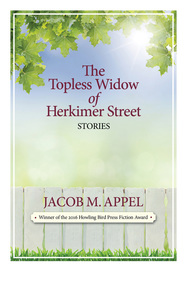Jacob Appel’s The Topless Widow of Herkimer Street proposes an intriguing question, and with it, a particular view on and of society. While it may play fast and loose with both extremes of logic, insisting on familiar reality at times and abandoning it to implausibility at others, its characters struggle with that compelling question of choice and consequence, often long after they have resigned themselves to passively letting their lives play out. The opening story “The Current Occupant” is one of the strongest. It begins with the ridiculous (though the story considers it simply irresponsible rather than focusing on the absurdity) situation of a mis-delivery of a mail-order house, an accidental demolition, and the supernatural-level of acceptance shown by the displaced owner who just happens to have a romantic history with Lewinter, the original house orderer. Despite its preposterousness, the scenario allows for an authentic interaction to occur between Lewinter and Kitty, a former flame. The two had long ago not just parted ways, but sped down diametrically separate paths, priorities, and philosophies.
A simple exchange states the collection’s major theme: Lewinter laments, “What choice do I have?” to which Kitty replies, “We all have choices.” Throughout the stories of the collection, Appel’s driving interest is in these choices and challenging our understanding of “choice.” Not necessarily the details of each individual one, but whether the choices of our life are real or illusory, whether we have any say in our lives’ direction at all. Most of all, the stories challenge whether we can choose to change or if we must stay the course once set. One of the collection’s strengths is how it presents this core dilemma through various ways and outcomes. Different characters respond differently when presented with a fundamental choice -- often the exotic versus the familiar, responsibility versus curiosity -- with some choosing selfishly and others quietly enduring sacrifice and the foregone “what if.” Appel uses the collection itself to compellingly present different outcomes; however, as similar elements, styles, and themes are repeated and reconfigured, subsequent stories don’t feel as fresh. The third story “Lessons in Platygaeanism,” however, stands out. Here, Appel is working outside his immediate comfort zone and that proves a welcome and fruitful risk. The story itself is strong and adds much needed variety in setting, situation, and perspective to the collection. Set in rural Alaska, “Lessons” follows a young boy and his eccentric uncle as they search for the edge of the world. It intrigues in its explorations of ontology and conviction, escalating to a surprising level of passion. This makes it miles distant, both literally and figuratively, from the manicured suburban lawns and reserved, affluent professionals that inhabit most of the collection’s other stories. Often the professions of Appel’s protagonists and their conflicts are directly related in ways that challenge these characters in their areas of comfort and expertise, but this is sometimes taken to such uncanny extents to feel at least convenient and occasionally contrived: the retired meteorologist faces a hurricane, the lawyer’s mother runs afoul of the law, the medical ethics professor’s daughter is put on life-support, the oncologist develops a tumor, the vet’s beloved dog suddenly dies. Their professions are in many respects their identities and Appel effectively challenges them by striking at their cores. On the other hand, this conceit is returned to frequently enough that it becomes noticeable, and in some instances, the characters are primarily defined by their professions in want of other compelling attributes. When considering each story individually, this isn’t an issue, but taken together, similarities appear. The titular story, which is otherwise strong and fascinating in situation and concept, falters in its resolution. After rising to what may be best called a geriatric rebellion against bras and decency, it recedes to the expected trappings of bureaucracy. The protagonist, the widow’s son and a lawyer, makes the sort of climactic, sincere courtroom plea that we’ve come to expect before the last commercial break in broadcast television procedurals. This may very well be the reasonable and realistic outcome, but miring the story in legal proceedings undermines narrative momentum and obscures any commentary or criticism. The prose--like the stories, like the protagonists--is careful, serious, and measured. It’s clear, efficient, and pragmatic, but unvaried. Every sentence is offered in utmost sincerity without ambiguity -- at times at the expense of intrigue. Whether the harmonic Kitty, “topless widow” Ilene, or a neighboring houseboat full of revelers, those considered outside this version of society’s mainstream are often viewed with a fetishistic combination of desire and disdain. Appel’s characters both envy and resent their freedom, while the stories are almost moralistic in their adherence and encouraged adherence to the status quo. Characters resist stepping “out of line” and those who do are routinely punished. There are clear lines drawn between responsible, respectable citizens and “outsiders,” and these divisions inform much of the action. Perhaps this is intended to cast a disparaging light on these circles of society and their rigid expectations but there is little irony across the eight tales and nothing to encourage a satirical reading over a straight one. Whatever the permutation of choice, Appel’s protagonists suffer: suffer in want of choice, suffer against unchoosable desire, suffer for choosing the exotic over the familiar. All of this suffering is presented in fully realized detail and makes for good conflict and drama. If Appel’s The Topless Widow of Herkimer Street intends to show us just how trapped we are in social roles and our own little lives, it does so with dignified resignation, rather than tragedy or outrage.
0 Comments
Leave a Reply. |
Archives
July 2024
Categories
All
|
|
Glassworks is a publication of Rowan University's Master of Arts in Writing 260 Victoria Street • Glassboro, New Jersey 08028 [email protected] |
All Content on this Site (c) 2024 Glassworks
|


 RSS Feed
RSS Feed
